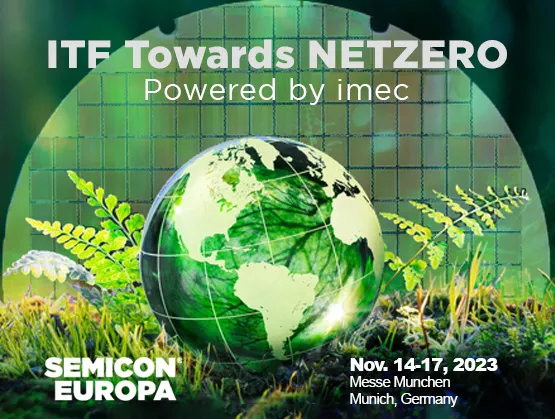
Semiconductor industry must unite now on actions to address climate change.
Time is running out for global efforts to achieve the necessary reductions in greenhouse gas emissions, as outlined in the commitment made at the 2015 Paris COP meeting to limit climate warming to less than 1.5°C. The ITF towards NETZERO conference, powered by imec, at SEMICON Europa delved into the urgent changes required within the rapidly expanding semiconductor industry to prevent further exacerbation of the precarious state of the world’s climate.
In her opening remarks, Emily Gallagher, Principal Member of Technical Staff at imec, highlighted the deteriorating condition of the climate, citing record temperatures in Europe and significant deviations in long-term temperature trends. She said, “we experienced record temperatures throughout Europe in July 2023. This year has seen a huge deviation of 5°C in the long-term temperature trend of the Mediterranean Sea, and a similar massive deviation in the extent of Antarctic sea ice. At the same time, we are breaching many other planetary boundaries, including for resource use and emissions of toxic chemicals.”
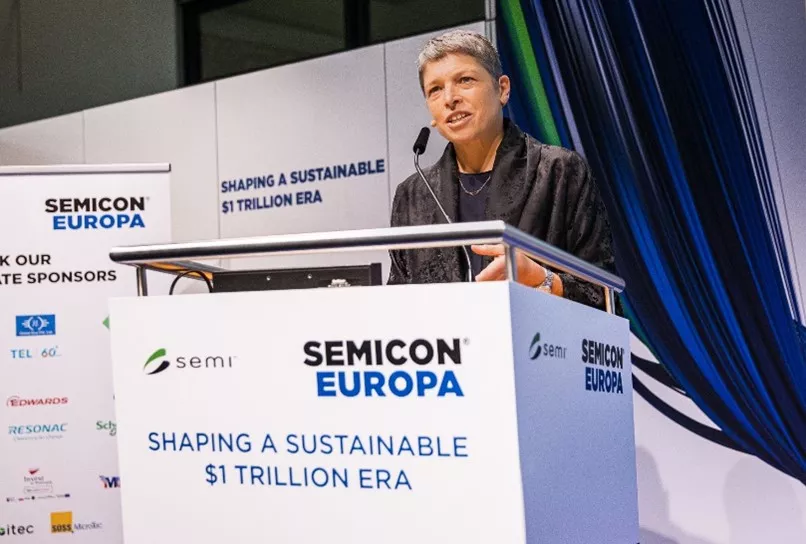
Emily Gallagher, Principal Member of Technical Staff, imec
According to Jean-Marc Girard, Chief Technology officer and Senior Vice President of Manufacturing Technologies at Air Liquide Advanced Materials, the limited time available is alarming. He noted, “the time available is scary. Energy consumption has a crucial role to play, because the timespan for decarbonizing energy generation infrastructure is very long. Our industry can make changes much more quickly in other areas such as replacing process gases that have a high global warming potential (GWP) with safer chemicals.”
Frederic Godemel, Executive Vice President at Schneider Electric, echoed concerns about energy consumption, stating that the semiconductor industry’s carbon footprint already matches that of a country the size of Portugal. Godemal warned that without efficiency improvements, the industry’s energy consumption could surge from 41 million to 86 million tonnes of CO2 equivalent as it progresses towards its global revenue target of $1 trillion.
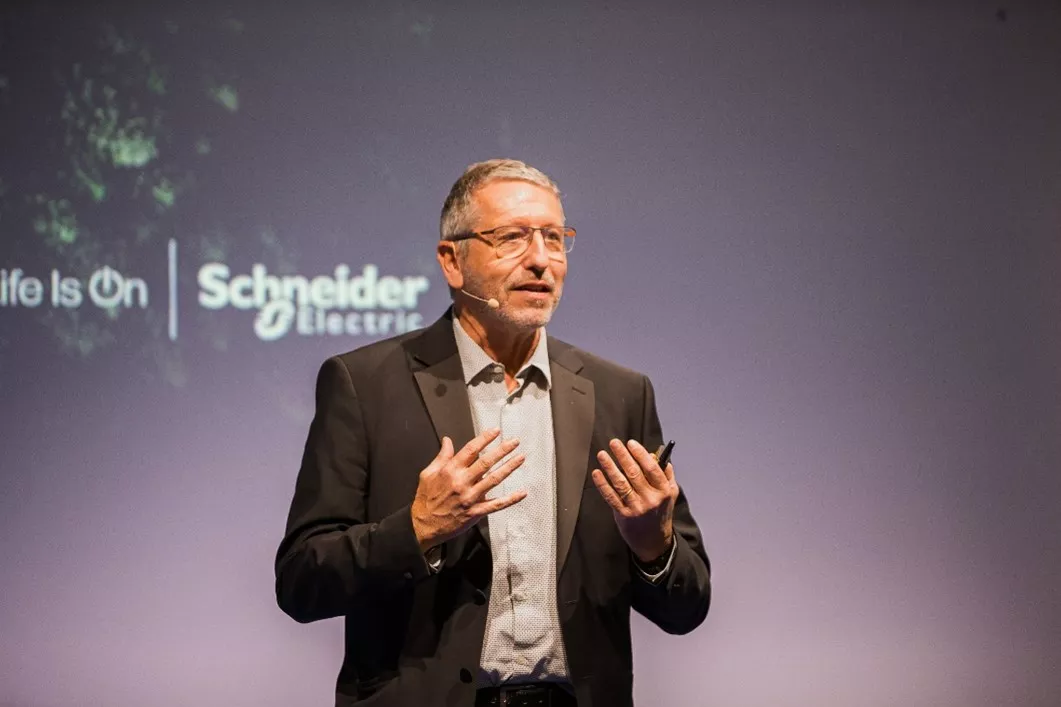
Frederic Godemel, Executive Vice President, Schneider Electric
Finding an effective response to the call for sustainability
Acknowledging the magnitude of the problem, the ITF towards NETZERO conference explored various solutions. Frederic Godemel highlighted technologies for large-scale digitalization and electrification of factory processes, which when applied in the semiconductor industry yielded impressive results: a 30% reduction in energy costs, a 30% average improvement in energy efficiency, and a 15% decrease in greenhouse gas emissions at a typical 300mm fab.
Karna Nisewaner, Corporate Vice President, General Counsel and Corporate Secretary at Cadence, emphasized the potential of artificial intelligence (AI). According to Nisewaner, AI enables electronic design automation (EDA) tools optimize for power and thermal performance more effectively, offering the possibility of achieving up to 35% in total power consumption savings beyond what traditional EDA technology could accomplish.
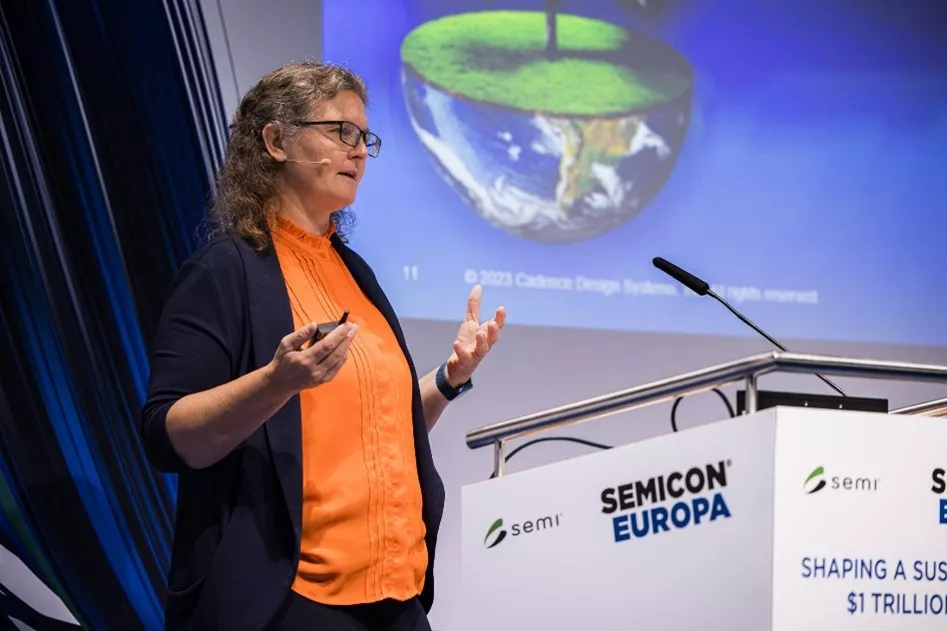
Karna Nisewaner, Corporate Vice President, General Counsel and Corporate Secretary, Cadence
During the panel discussion, Collaborative strategies and practical solutions towards a more sustainable semiconductor future, panelists emphasized the need for the semiconductor industry to adopt a broader perspective beyond optimizing individual tools or processes. Jean-Marc Girard of Air Liquide stressed the importance of improved material management in the subfab, calling for industry-wide collaboration to address the significant and complex challenges.
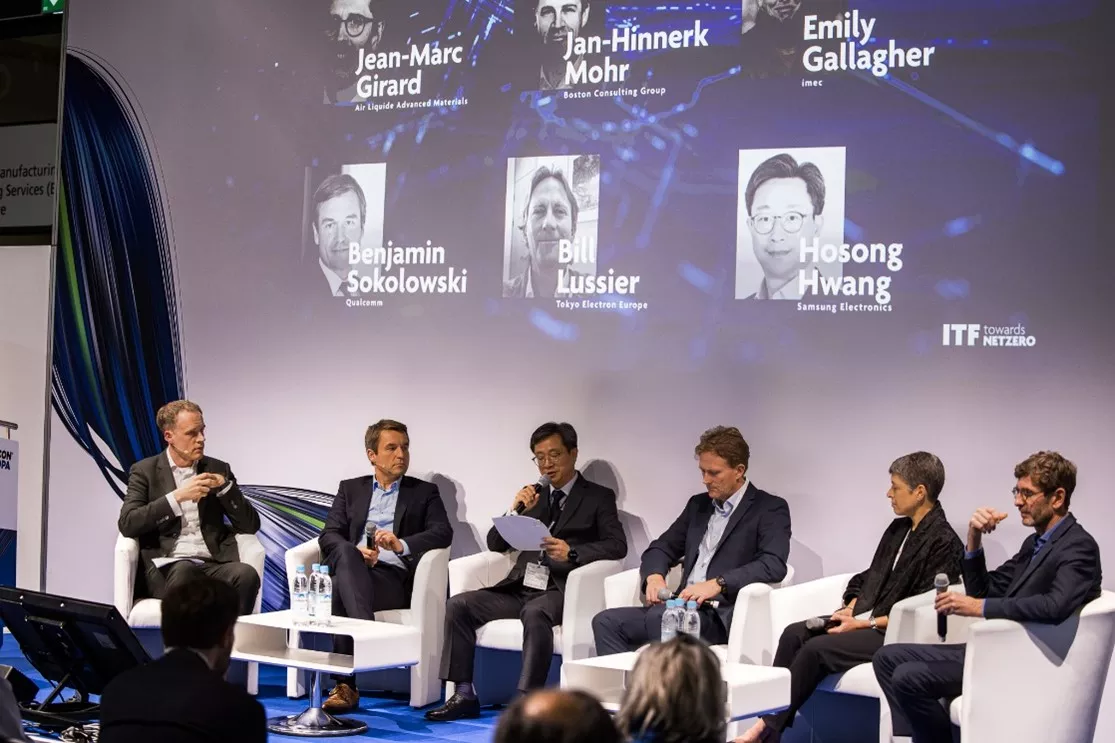
Left to right: Benjamin Sokolowski, Managing Director and Vice President Government Affairs EMEA, Qualcomm; Jan-Hinnerk Mohr, Managing Director and Partner, Boston Consulting Group; Emily Gallagher, Principal Member of Technical Staff, imec; Jean-Marc Girard, CTO and Senior Vice President of Manufacturing Technologies, Air Liquide Advanced Materials; Bill Lussier, Senior Vice President Regional Sales and Deputy GM, Tokyo Electron Europe Ltd; Hosong Hwang, Head of the Environment Team, Samsung Electronics
Bill Lussier, Senior Vice President of Regional Sales and Deputy General Manager at Tokyo Electron Europe, advocated for systemic thinking, introducing the concept of a PPAC+E; chip designs optimized not only for Power, Performance, Area, and Cost but also for the Environment. “You need to embed the mindset that sustainability is a critical factor in every decision,” he stated.
Katrien Marent, Executive Vice President and Chief Marketing and Communications Officer at imec, reinforced the collaborative approach, stating that solving the net zero challenge requires innovation and cooperation across the industry, noting that “events such as this ITF towards NETZERO conference show how important innovation and collaboration are to the industry’s chances of success in growing sustainably.”
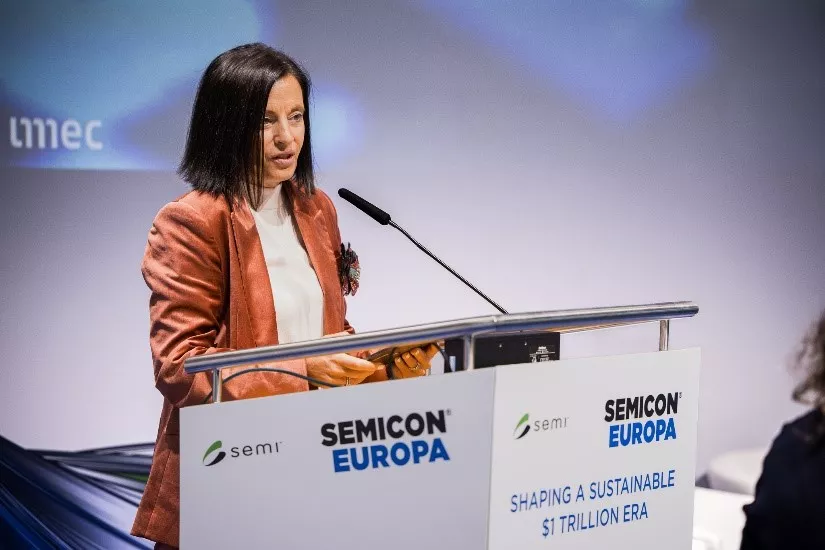
Katrien Marent, Executive Vice President, Chief Marketing and Communications Officer, imec
During her talk, Anneclaire Mohr, Senior Director of Manufacturing and Sustainability, Global Government Affairs at Intel reiterated the importance of collaboration to solving sustainability challenges: “The entire semiconductor supply chain is facing the similar challenges and opportunities as we work to reduce our collective footprint. At Intel, we believe that collaborative actions are key to reduce greenhouse gas emissions, water, and energy use, while increasing the use of renewable energy and investing in green chemistry research. We strongly encourage our suppliers to join initiatives like the SEMI Semiconductor Climate Consortium, the Catalyze program, or similar initiatives to facilitate that critical collaboration.”
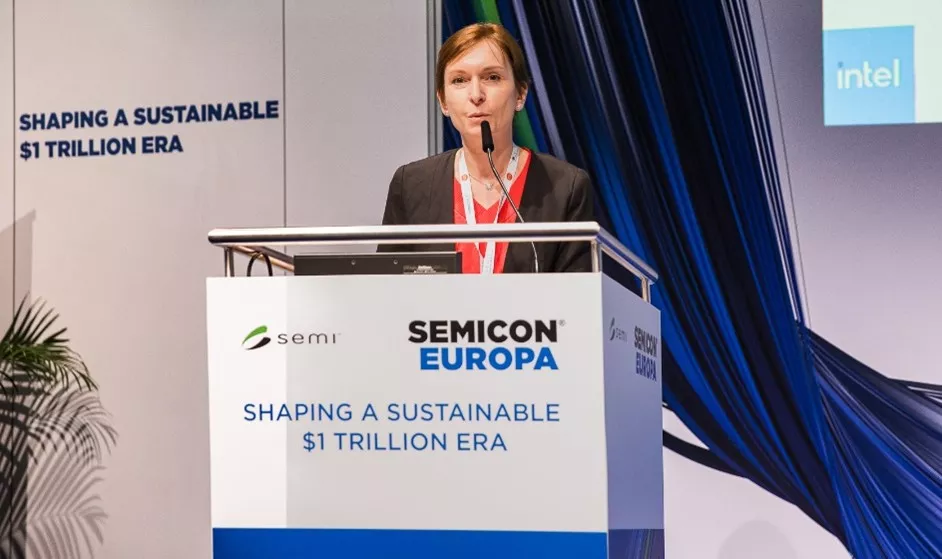
Anneclaire Mohr, Senior Director of Manufacturing and Sustainability, Global Government Affairs at Intel Germany GmbH & Co. KG
Chris Jones, Environmental Solutions Business Development Manager at Edwards Vacuum echoed the sentiment: “With the Semiconductor Climate Consortium, we are stepping up to the environmental challenges our industry faces. As we grow, so does our responsibility to manage greenhouse gas emissions effectively. Our work is about creating real change and focusing on practical, shared solutions that make a difference.”
Questions over role of regulation
Initiatives like the Semiconductor Climate Consortium (SCC) demonstrate the industry’s acknowledgement of its climate impact. However, the question arises whether industry self-regulation is sufficient or if government intervention, particularly regarding substances like PFAS, will be necessary.
Benjamin Sokolowski, Managing Director and EMEA Vice President of Government Affairs at Qualcomm, emphasized the complexities of global harmonization in legislation, cautioning that poorly synchronized regulations could harm competitiveness. Despite potential challenges he affirmed, “Qualcomm will continue to invest in the sustainability of its products, because energy efficiency and low power consumption are what make its chips competitive.”
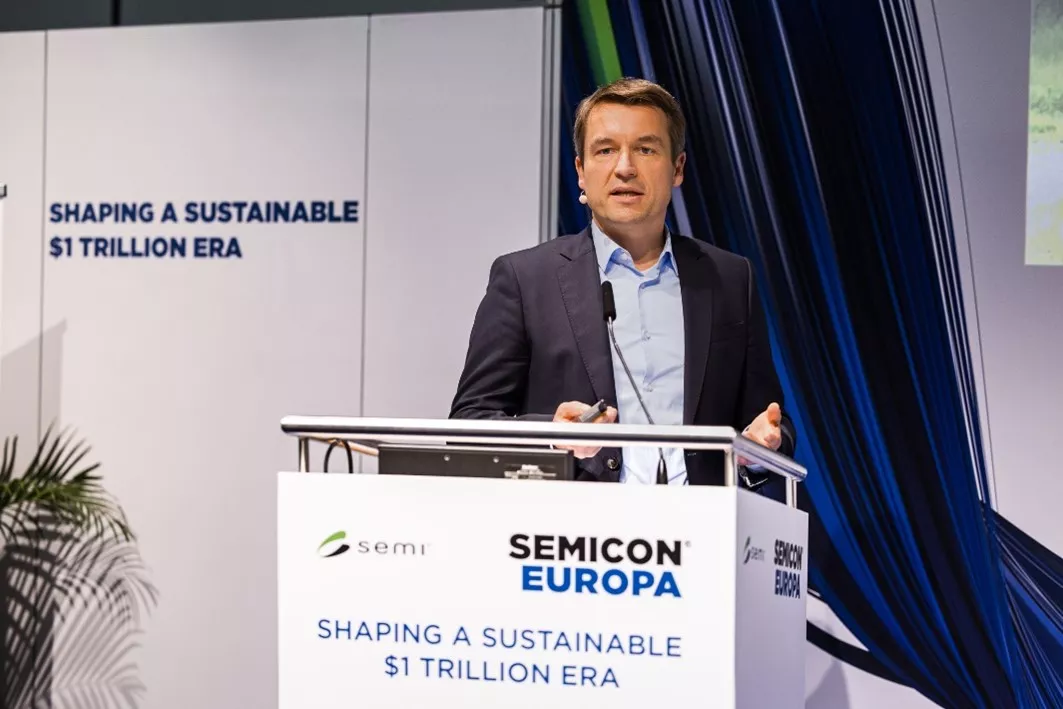
Benjamin Sokolowski, Managing Director and Vice President of Government Affairs EMEA, Qualcomm
Addressing the financial aspect in finding process gases with a lower global warming potential, Jean-Marc Girard highlighted the consumer’s role in footing the bill for sustainability investments. He noted, “down the road, it’s always the consumer. With sustainability, it can cost more in the short term, but it tends to end up saving money in the long term, so committing to sustainability is about managing people’s expectations about timescales,” emphasizing the long-term savings potential.
Mousumi Bhat, Vice President of Sustainability Program at SEMI, expressed appreciation for the industry’s commitment to SEMI’s sustainability initiatives but stressed the importance of maintaining this dedication. She highlighted the urgency of the situation, noting, “this year’s COP28 shows that we are on a pathway to between 2.2°C and 3.4°C of warming by 2100 and the window of time for action is very narrow. Governments have not been organized enough to meet the world’s expectations to date. Companies need to step in to provide the organization that is needed.” She concluded by underscoring the industry’s critical role in contributing to the ambitious goals of COP28.
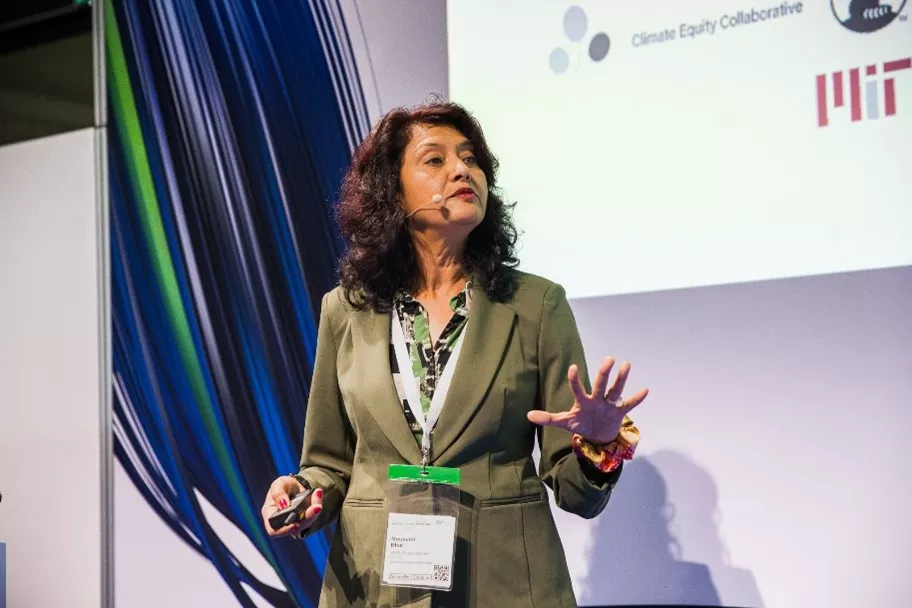
Mousumi Bhat, Vice President of Sustainability Programs, SEMI
On behalf of SEMI and imec, the SEMI Europe team would like to express appreciation to the industry leaders in the ITF towards NETZERO conference for sharing their visions, plans, and readiness to collaborate to achieve sustainability goals towards net zero.
Cassandra Melvin is Senior Director of Business Development and Operations at SEMI Europe.